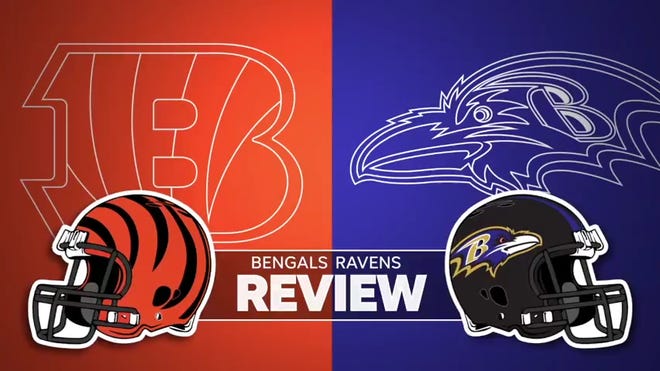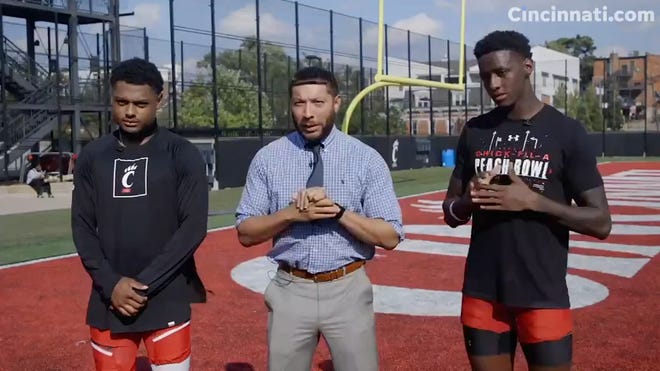
Don’t be surprised if you hear Brian Callahan’s name mentioned as a candidate for potential head coach openings in the NFL over the next few weeks.
The NFL changed its rules regarding when teams with a vacant opening can begin to interview coaches. Prior to the rule change, teams had to wait until the regular season concluded before conducting interviews. As of Tuesday, teams can begin the interview process with candidates if they have already fired their coach.
Callahan, 37, is in his third year as offensive coordinator for the Bengals and has played a key role in Cincinnati’s offensive success this season.

With so many teams wanting to keep up with the trend of hiring young, offensive-minded coaches to run their teams, Callahan is bound to get an interview opportunity soon.
Among the many reasons Callahan would be an ideal candidate, his work with quarterbacks speaks for itself. Callahan has worked with top-tier quarterbacks his whole career including Peyton Manning, Matthew Stafford and now Burrow.
'Desire to be great':How Tee Higgins has evolved as a Bengals receiver over the last year
Bengals prep for big test against Chiefs:‘It’s far and away the biggest game of the year’
As the son of Bill Callahan, one of the most well-respected offensive line coaches in the NFL, he also has a wealth of knowledge on how to put together a run scheme and protection plans. He checks all the boxes.
When asked what exactly Callahan is responsible for on a weekly basis given head coach Zac Taylor runs the offense and calls plays, Taylor’s one-word answer explains Callahan’s value to Bengals.
“Everything.”
Where it all started for Callahan
Callahan is a film junkie. Every Monday and Tuesday in the NFL season, he spends most of his day in front of a screen. And yes, he too has blue light glasses to protect his eyes.
After watching film of the game from the day before and meeting with offense, Callahan turns the page to his next opponent around 2 p.m. on Monday. For the next 24 hours, if Callahan isn’t watching more tape, he’s meeting with Taylor. Of all members on Taylor’s staff, Callahan spends the most time with Cincinnati’s head coach. Callahan sets the plan for Taylor and the two meet Monday afternoon to start the game plan.
First comes an in-depth look at what their opponent does on the base downs which are first and second downs. Next up comes the blitz packages and the protection plan. Then comes third down and red zone. Then Callahan and Taylor meet with run game coordinator Frank Pollack on how to marry the run and pass game.
By the time the players arrive for meetings on Wednesday, there’s not one area of the game plan Callahan doesn’t know. He learned the importance of this and created his approach early on his career.
Callahan first started his career in the NFL as a coaching assistant for the Denver Broncos in 2015. The quarterback for the Broncos at that time? Peyton Manning. Callahan credits his work with Manning for how he developed as a young coach.
“A lot of it having to do with spending time with Peyton Manning,” Callahan said. “The amount of film study it requires to be on top of the details and on top of what you’re going to see and (be able to) anticipate. I got in that mode early in my career and I really haven’t changed. I try to watch every bit of film I can watch.”
When you work with quarterbacks as good as Manning, Stafford and even Burrow in his second year, there’s a certain level of trust that needs to be gained. Callahan believes trust can be earned by preparation. It’s why he’s always prepared.
“When you have a guy like Peyton at that point who’s played 15 years, he’s seen every defense and every look," Callahan said. "Part of my role in Denver when I was there with him, I did a lot of the blitz preparation and a lot of the film breakdowns. He would sometimes come in and have questions about a game from eight games ago, (he would say) ‘Hey, go to play six of this game and (he would say) ‘did we call this coverage right?’ You always had to be on.”
In addition to his comprehensive knowledge of the offense, Callahan’s ability to connect with his quarterbacks, like Burrow, to ensure he’s comfortable with every play is one of the reasons he’s as respected as he is by his players.
“He really helps me understand the red zone,” Burrow said of what Callahan does exceptionally well. “That’s what Brian does every week. He really helps me understand the defense and the red zone. Then he listens to me about what I like and don’t like.”
Burrow feels this way about Callahan and Taylor and it’s why they are a perfect pairing.
“If I don’t like a play that they might feel good about, if I don’t feel good about it, it’s probably not going to get called,” Burrow said.
Burrow is playing as well as any quarterback in the NFL right now and there’s no question the collaboration he has with Callahan and Taylor is helping him play at such a high level.
When the Bengals hired Taylor, his work with quarterbacks is what garnered the most attention. See any similarities?
But the main difference between Callahan and Taylor’s coaching journeys is Taylor had never been an offensive coordinator before being head coach in the NFL. Callahan now has three years of coordinating the Bengals’ offense under his belt.
And if you’re thinking Callahan’s lack of play-calling experience could become a factor in why a team would be hesitant of interviewing him for a head coaching position, think again.
Yes, Taylor calls the plays for the Bengals, but Callahan is a huge part of the process.
“If people could hear the headset (with me saying) ‘Hey Brian, here’s what I’m thinking. What do you think? (He’ll say) I think that’s a great call Zac,’ ” Taylor said. "‘Or no, I think we might get quarters (coverage) here, so you might think about calling this.’ It’s semantics on who calls plays. I feel like he calls a lot of plays because I know that if he’s saying something he’s certainly put in the work and is an expert on what we’re about to see. If we run 60 plays, he’s a part of all of them.”
If the opportunity were to present itself, Callahan believes he’s more than ready to call plays. That’s not to say he thinks he should be calling them over Taylor. Taylor and Callahan both reiterated at times the play-calling piece of the game plan is at times overblown because of the collaboration that takes place in the days leading up to the game.
“I’ve felt like I’ve been ready to call plays for a long time,” Callahan said. “But I do think it’s important that the guy in charge is calling the plays he wants them called. I also think the process of play-calling gets overblown. There’s a ton of preparation that goes into setting a game plan for Sunday.”
Callahan’s confidence in his ability to be able to call plays if it became a job responsibility for him stems from his preparation. When Callahan was the quarterbacks coach for the Detroit Lions from 2016-17, he practiced while on the road in his hotel on Saturday nights. Callahan would turn on a college game, turn the volume down and take out his call sheet and would look at the sheet and as situations came up, he would rehearse.
He and Taylor in their first two years of working together would also practice their calls on Saturday nights as a “dry run” before their next game.
“I think you’re always as an offensive coach putting yourself in positions of, ‘What would I do here? How would I handle this?’” Callahan said.
But at the end of the day, Callahan doesn’t consume his mind with anything other than doing the job he’s asked to do to the highest level. It’s probably why he’s climbed the ladder as quickly as he has in his career.

His end goal, like most coaches in the NFL, is to be a head coach. And given the Bengals’ offensive success this season and what’s likely to come for the foreseeable future with Burrow and the skill players Cincinnati has, the Bengals offense will continue to get a lot of attention.
Callahan’s name is already on the radar and if the Bengals clinch a playoff berth in the next two weeks, you’ll be hearing more and more of Callahan’s name.
And while he’s likely to start garnering more national attention, it won’t phase him. Callahan falls back on a piece of advice his father gave him a long time ago.
“The most important thing is doing a good job wherever your job is, whatever that job is,” Callahan said. “And so, I just try to do that. I don’t really think about much else. I try to be the best assistant I can be. I try to do my job and what’s required of me at the highest level I can.”
Source link










